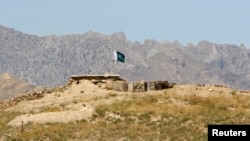A splinter faction of the Pakistani Taliban is accusing security forces in Pakistan of killing its detained members in “fake encounters,” and has denied as false army attacks on the group’s “imaginary” camps.
The Pakistan military’s media wing says security forces have killed more than 100 “terrorists” in a nationwide crackdown in response to this past week’s deadly militant attacks, including the suicide bombing of a famous Sufi shrine in the country’s south.
Authorities say that militants killed in the crackdown belonged to terrorist groups, including the splinter Jammat-ul Ahrar (JuA) faction, which has taken credit for most of the violence, although Islamic State claimed responsibility for bombing the shrine, which killed around 90 devotees and wounded more than 300 others.
In a statement sent to reporters Saturday, Jammat-ul Ahrar asserted its recent bombing and other attacks in Pakistan have “embarrassed” the military and prompted it to falsely demonstrate “bravery“ through a baseless media propaganda campaign.
Pakistani officials maintain Jammat-ul Ahrar used its sanctuaries in border areas of Afghanistan to mastermind the violence.
On Friday, the military also handed over a list of 76 “terrorists” to Afghan diplomats in Islamabad, saying they are hiding on their side of the border and demanded Kabul swiftly take action against the militants and hand them over to Pakistan.
Pakistani troops have also shelled areas across the Afghan border since the attack on the shrine. Local media quoted sources as saying the targets were JuA’s camps and killed "a large number of militants."
“Our fighters are safe in their camps and the enemy cannot even think of going into those areas,” the JuA statement said, without elaborating. It was not possible to independently verify the militant claims.
The United States is among countries that have designated Jammat-ul Ahrar as a global terrorist group.
Successes overinflated?
Pakistani troops have been conducting major security operations in tribal areas near the Afghan border since June, 2014, and claim to have cleared most of them of insurgent bases and terrorist networks blamed for years of violence in the country that killed tens of thousands of people.
The actions led to a significant decline in militant attacks in recent months. But the latest spike in violence in Pakistan suggests the militants are still capable of staging attacks at will.
Meanwhile, the Afghan military welcomed and promised Saturday to look into the Pakistani list of 76 suspected terrorists because the Afghan government is determined not to allow its soil to be used for terrorist activities in other countries.
But speaking to reporters in Kabul, Army Chief General Qadam Shah Shaheem reiterated long-running Afghan demands for Islamabad to take action against sanctuaries on its side of the border being used for insurgent attacks in Afghanistan.
“We will investigate it (the Pakistani list), and if there is a need for more evidence and documents we will ask for it. But we also handed over a number of lists with enough evidences and documents to Pakistan and we hope they will also sincerely take action on them,” asserted General Shaheem.
He also criticized Pakistan for unilaterally sealing border crossings with Afghanistan following recent militant attacks, calling the action against “all diplomatic norms and unfortunate.”
The Afghan general also alleged that on Friday alone Pakistani troops fired about 200 shells into a border district of eastern Afghan province of Nangarhar. He did not say whether the firing caused any damage.
Mutual terrorism allegations have plunged relations between Pakistan and Afghanistan to new lows in recent months. The latest round of a "war of words" is likely to present challenges to efforts to improve ties.





